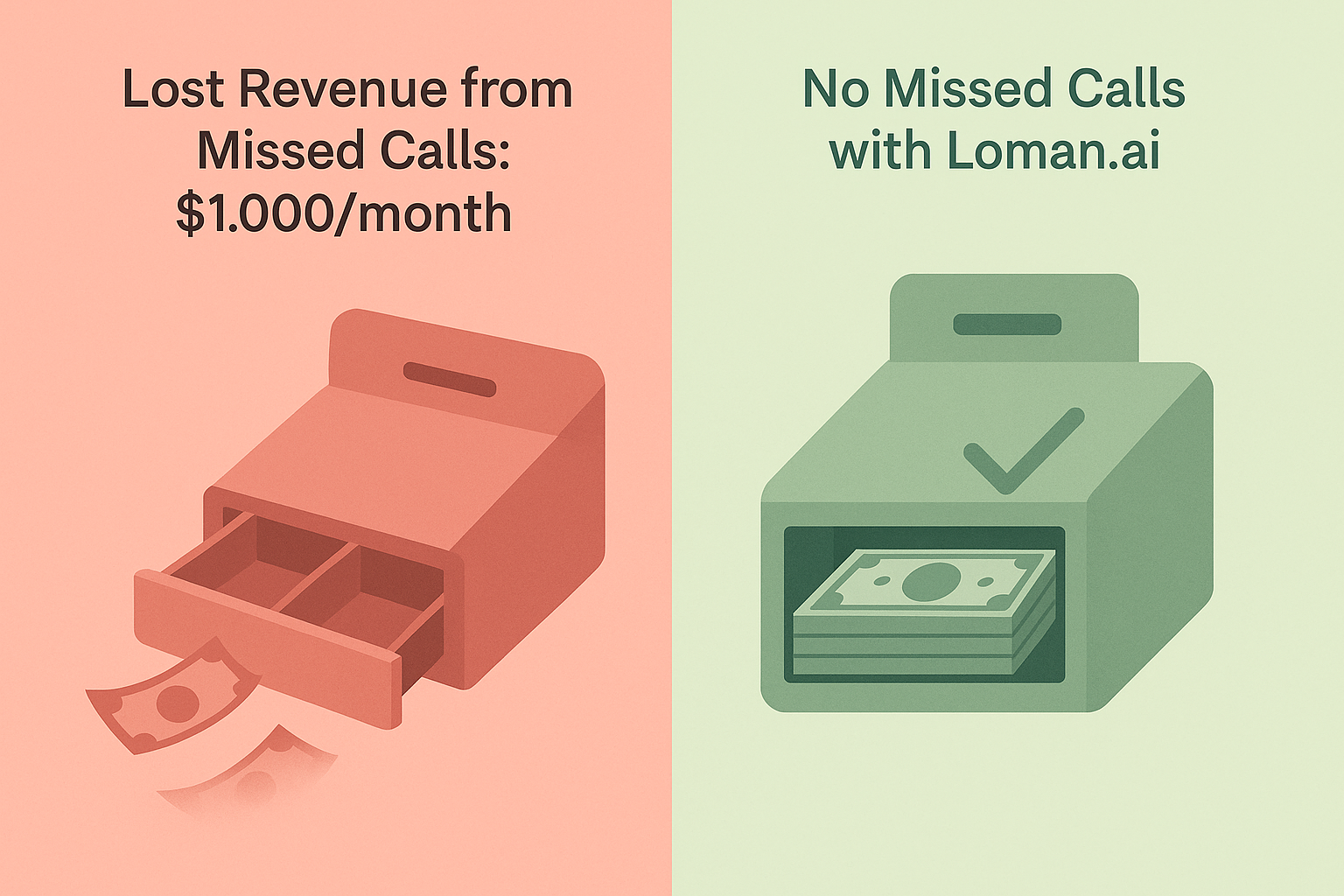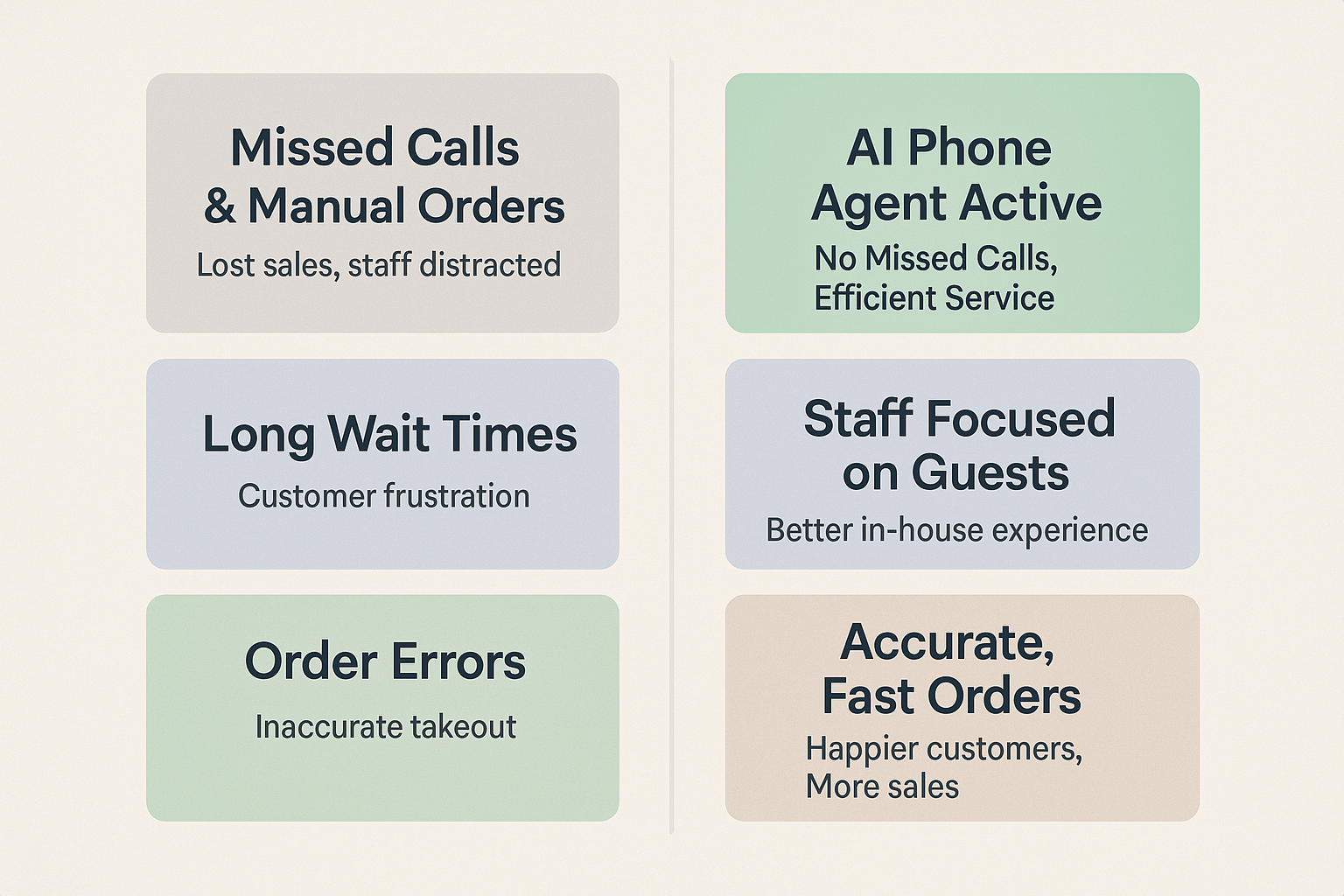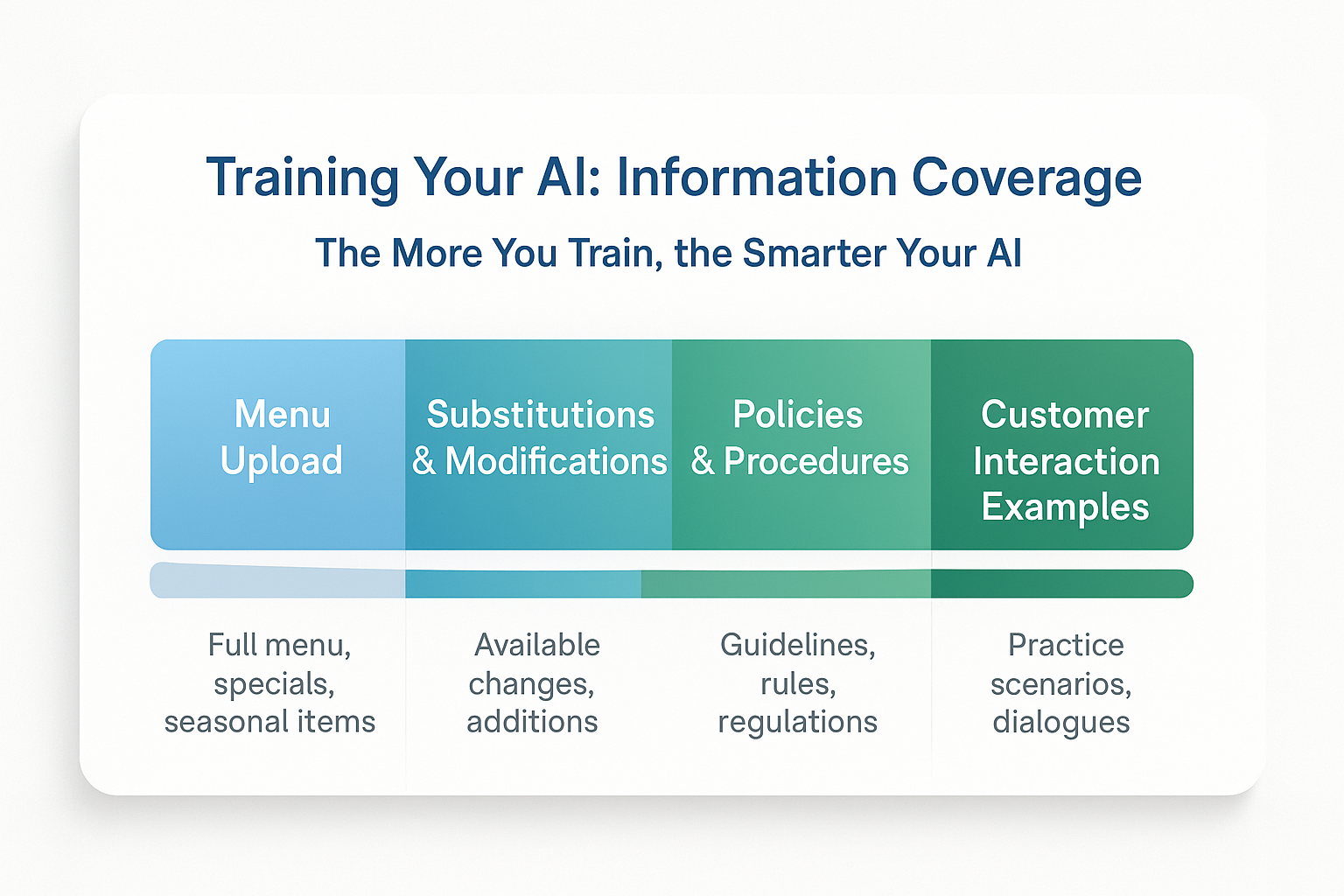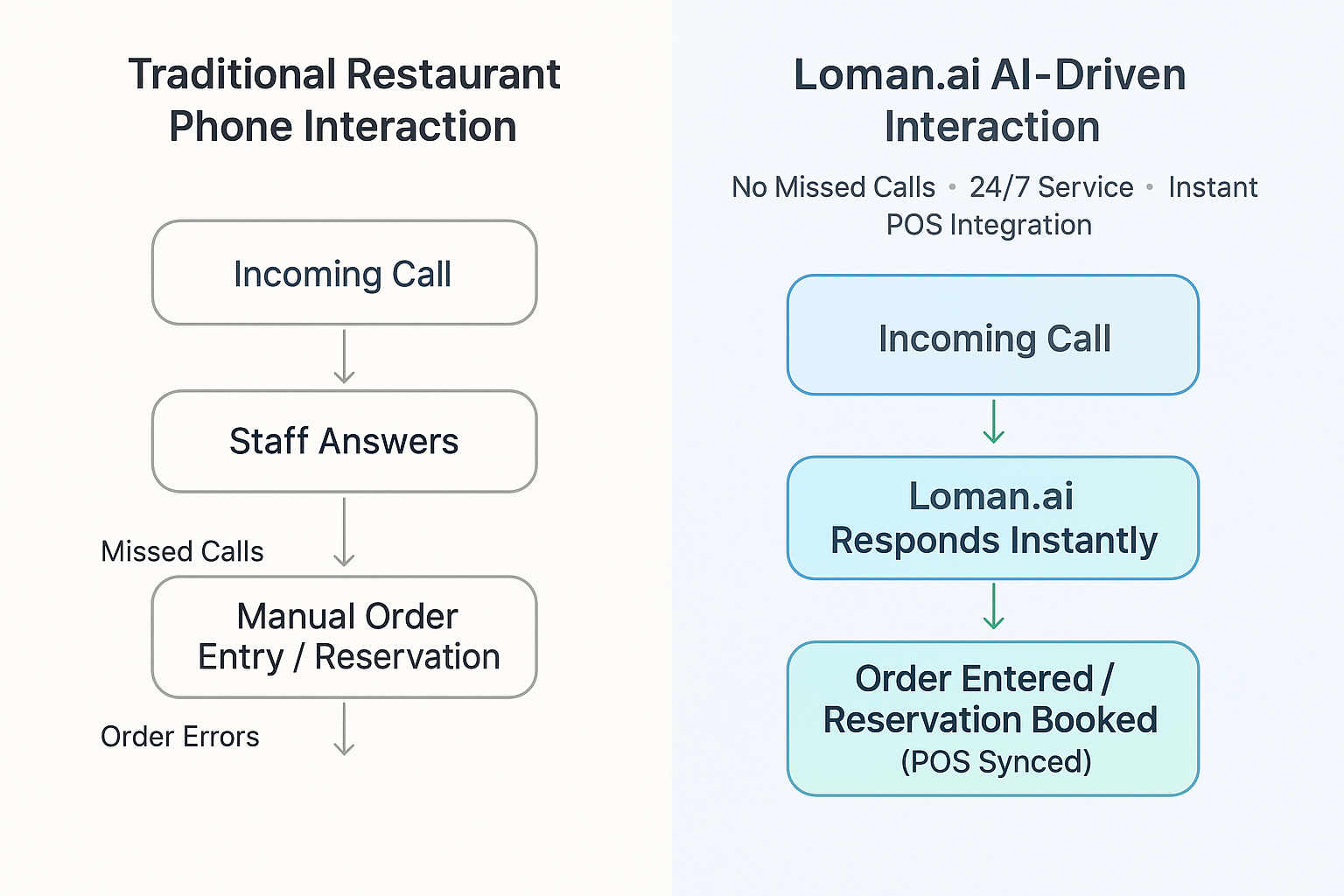August 26, 2025

Imagine never missing another customer call or order, even during your busiest dinner rush. Smart restaurant phone assistants powered by AI are revolutionizing how eateries handle communication, boosting efficiency and sales around the clock. Loman.ai's cutting-edge solution seamlessly integrates with your existing systems, allowing your staff to focus on creating exceptional dining experiences while the AI handles the phones.
Did you know that restaurants lose an average of $1,000 per month in revenue from missed calls? That's a big chunk of change slipping through the cracks. Let's dive into how restaurants have handled phone management over the years and why it's ripe for an upgrade.

For decades, restaurants relied on staff to juggle phones while serving in-house customers. This balancing act often led to:
These issues not only hurt sales but also damaged customer relationships. A case study in the hospitality industry found that poor phone management led to a 20% drop in customer satisfaction scores.
Let's break down the impact of those missed calls:
That adds up fast. No wonder restaurant owners are looking for better solutions.
Smart restaurant phone assistants are changing the game. These AI-powered tools can:
By handling these tasks, AI assistants free up staff to focus on in-house customers. They also ensure no opportunity for business is missed, even during the busiest rush. Our product, Loman.ai, does this while seamlessly integrating with existing restaurant systems.
Smart restaurant phone assistants are changing how eateries handle calls and orders. These AI-powered tools can do a lot to make life easier for restaurant staff and customers alike.
Let's look at some of the key features that make these assistants so helpful:
These features work together to make your restaurant run smoother. Customers get faster service, and your staff can focus on the people actually in your restaurant.

With an AI assistant handling calls, your team can get more done. They're not constantly running to answer the phone or jotting down orders. This means better service for dine-in customers and fewer mistakes on takeout orders.
Plus, you'll never miss a call again. Even during your busiest hours or in the middle of the night, the AI is there to help customers and take orders. This can lead to more sales and happier customers overall.
Getting started with an AI phone assistant isn't as hard as you might think. Here's a simple guide to help you set things up:
The key is to start small and build up. You don't have to switch everything over at once. Maybe begin with just handling reservations, then move on to taking orders once you're comfortable.

For your AI to work well, it needs to know your restaurant inside and out. This means:
The more info you give your AI, the better it can help your customers. It's like training a new staff member, but one that never forgets and is always available.
To know if your AI assistant is really helping, you need to track some key numbers. Here are the main things to watch:
It's not just about the numbers, though. Listen to your staff too. Are they less stressed? Do they have more time to focus on in-house customers? These things matter just as much as the hard data.
Many restaurants see big improvements after adding an AI phone assistant. For example, Jet's Pizza saw a 30% increase in sales after implementing AI for phone orders. That's a huge jump, and it shows how powerful these tools can be.
But it's not just about more sales. Restaurants often report happier customers and staff too. When calls are handled quickly and accurately, everyone wins.
Our product, Loman.ai, has helped many restaurants boost their efficiency and sales. One owner saw a 25% increase in sales after just a month of use. Another found that the AI was more accurate at taking orders than their human staff.
The bottom line? A good AI phone assistant can make a real difference to your restaurant's success. It's worth considering if you want to stay competitive and keep your customers happy.

AI phone assistants are quickly becoming a must-have for busy restaurants. As the technology evolves, we're likely to see some big changes in how these smart assistants handle customer interactions.
Here are some key trends to watch:
AI assistants will soon sound almost human-like. They'll pick up on context clues and emotion, making chats with customers feel more natural. This means they'll be able to handle trickier situations that currently need a human touch.
Expect AI to take on more responsibilities beyond just taking orders and reservations. They may start offering personalized menu recommendations based on dietary needs or past orders. Some restaurants are even testing AI that can upsell items or handle complaints.
As AI gets smarter, it will work hand-in-hand with other restaurant tech. Imagine an AI assistant that can check loyalty points, apply discounts, and update online wait times all in one call. This level of integration will make the entire dining experience smoother for customers.
But what does this mean for restaurant staff? While some worry AI might replace jobs, it's more likely to change them. Servers and hosts may shift to focus more on creating great in-person experiences, while AI handles routine phone tasks.
A recent survey found that nearly 8 in 10 regular diners believe AI voice assistants will handle most food ordering in the next few years. This shows how quickly customers are adapting to and expecting AI-powered service.
Smart restaurant phone assistants like Loman.ai are at the forefront of this shift. By handling calls 24/7 and integrating with existing systems, they're already showing how AI can boost efficiency and customer satisfaction. As the technology grows, restaurants that embrace these tools will likely find themselves with a strong advantage.
Smart restaurant phone assistants are changing how eateries handle calls and orders. They're not just fancy gadgets - they're practical tools that can seriously boost your bottom line. By taking care of routine tasks like answering phones and taking orders, these AI helpers free up your staff to focus on what really matters: making great food and keeping customers happy.
The numbers don't lie. Restaurants using AI phone systems are seeing real results, from increased sales to happier customers. It's not about replacing people, but about making your team more effective. And in a business where every minute counts, that extra efficiency can make a big difference.
If you're curious about how this tech could work for your restaurant, it might be worth checking out. Loman.ai offers a demo that lets you see their AI phone assistant in action. It's a good way to get a feel for how it could fit into your operations without any pressure.
As the restaurant industry keeps evolving, staying ahead of the curve can give you a real edge. Whether you run a quick-service joint or a full-service restaurant, there's probably an AI solution that could help streamline your phone operations. It's worth taking a look to see if it's right for you.
Next up, we'll tackle some common questions about AI phone assistants in restaurants. If you've been wondering about the nitty-gritty details, stay tuned - we've got you covered.
AI phone assistants for restaurants usually cost between $100 to $500 per month, depending on features and call volume. Many providers, including Loman.ai, offer tiered pricing plans to fit different restaurant sizes and needs. The cost is often offset by increased efficiency and sales.
Yes, modern AI assistants are trained to handle various menu modifications. They can process requests for ingredient substitutions, dietary restrictions, and special preparations. Loman.ai, for example, is customized to each restaurant's specific menu and can manage intricate order details.
If the AI encounters difficulty understanding a customer, it's programmed to politely ask for clarification. If issues persist, the system can transfer the call to a human staff member. This ensures that all customer needs are met, even in complex situations.
AI phone systems prioritize data security. They use encryption and secure servers to protect customer information. Reputable providers comply with data protection regulations and implement measures to prevent unauthorized access. It's always good to check the specific security features of your chosen system.
Absolutely. Most AI phone assistants, including Loman.ai, can work with your current business phone number. The integration process is usually straightforward and doesn't require changing your number or disrupting your existing phone setup.
An AI phone assistant handles routine calls, freeing up your staff to focus on in-house customers and more complex tasks. This leads to better customer service and more efficient operations. Many restaurant owners report that their teams are less stressed and more productive after implementing an AI assistant.

Enter your information in the form to receive a call from Loman and place an order like a customer would!